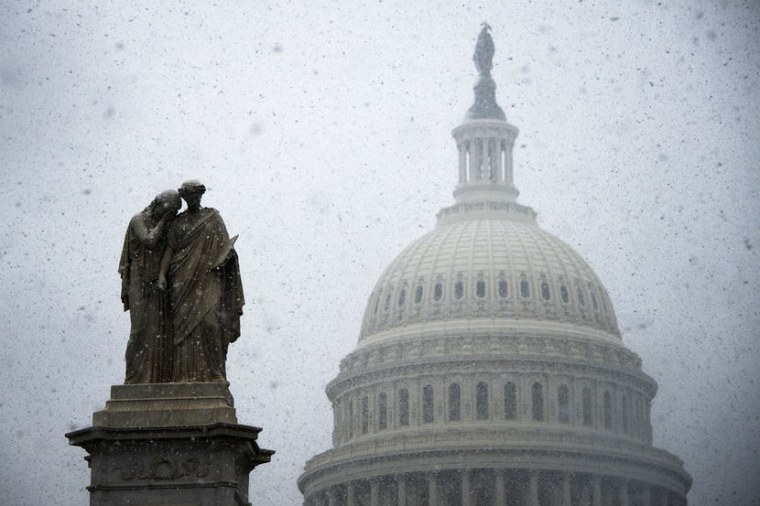Almost immediately after President Joe Biden's inauguration, Democratic leaders realized that the budget reconciliation process would be needed to pass an ambitious COVID relief package. There was no great mystery as to why: Senate Republicans left no doubt that they intended to kill the plan with a filibuster, and reconciliation would allow the Democratic majority to pass a proposal with 50 votes.
On Tuesday, Senate Dems took the first step, agreeing to start the debate on a budget resolution that would make it possible to pass a $1.9 trillion package. Last night, they took the second step.
The Senate early Friday passed a budget resolution that kicks off the special reconciliation process Democrats are using to pass a new round of Covid relief. The resolution passed in a 51-50 party-line vote just after 5:30 a.m. ET, with Vice President Kamala Harris casting one of her first two tie-breaking votes to help Democrats approve the measure.
As nearly everyone involved concedes, the process is absurd to the point of satire. Senate Majority Leader Chuck Schumer (D-N.Y.) launched the debate on Tuesday, which culminated with a 15-hour overnight marathon known as a "vote-a-rama": a silly name for an exasperating process in which, thanks to arcane budget rules, senators can push non-binding votes on literally hundreds of politicized amendments.
Those amendments must be deemed "germane" -- which is to say, relevant -- to the budgetary process, and while Republicans filed more than 800 amendments, only about 40 received votes. Fifteen hours later, senators mercifully ended the process.
(On a personal note, I get up at 5 a.m. eastern, and was amazed to see senators were still at it. A tip of the hat to the Capitol Hill reporters who managed to stay awake long enough to cover the whole thing.)
As for the practical effects of the overnight developments, NBC News' report added, "Some of the amendments adopted by the Senate include grants for restaurants and bars affected by the pandemic and a provision to prevent tax increases on small businesses during the crisis."
Senators also agreed to limit direct-aid checks for high earners -- it passed 99 to 1 -- but the amendment didn't include any specific income levels.
What happens now? Because the budget resolution was amended, it now heads to the Democratic-led House, with the Rules Committee taking up the matter in about an hour. By all accounts, the bill will pass the chamber, though it's not yet clear when, and some weekend work is a possibility.
Once it clears the House, the budget resolution will not go to the White House for Biden's signature, because the president plays no formal role in the legislative budgetary process.
Then, of course, the real work begins: actually writing, scrutinizing, debating, and trying to pass an ambitious COVID relief package.
As we discussed a few days ago, the odds are that when all is said and done, Democrats will end up passing a worthwhile bill, but I'd caution against assuming that success is inevitable. The differences of opinion among Democrats are considerable; the House Democratic majority is narrow; and in the Senate, if even one member of the Democratic conference doesn't like the final package for any reason, it'll die.
Indeed, Sen. Joe Manchin (D-W.Va.) talked to Fox News this week and continued to emphasize the importance of bipartisan cooperation. "I have made it very clear ... we're going to make this work in a bipartisan way," Congress' most conservative Democrat said. "My friends on the other side are going to have input. And we're going to do something that we agree on. I'm not just going to do it just down the lines of, just saying party-line vote."
None of this will be easy. A whole lot of struggling families, communities, and businesses will be counting on Democrats to eventually cross the finish line, but given the severity of the crisis, the scope of the response, and the non-existent margin for error, this will be a heavy lift.
Update: The House did, in fact, approve the Senate's version of the resolution this afternoon. The process of writing the bill will begin in earnest next week, with the target of passing a bill by the end of the month.

